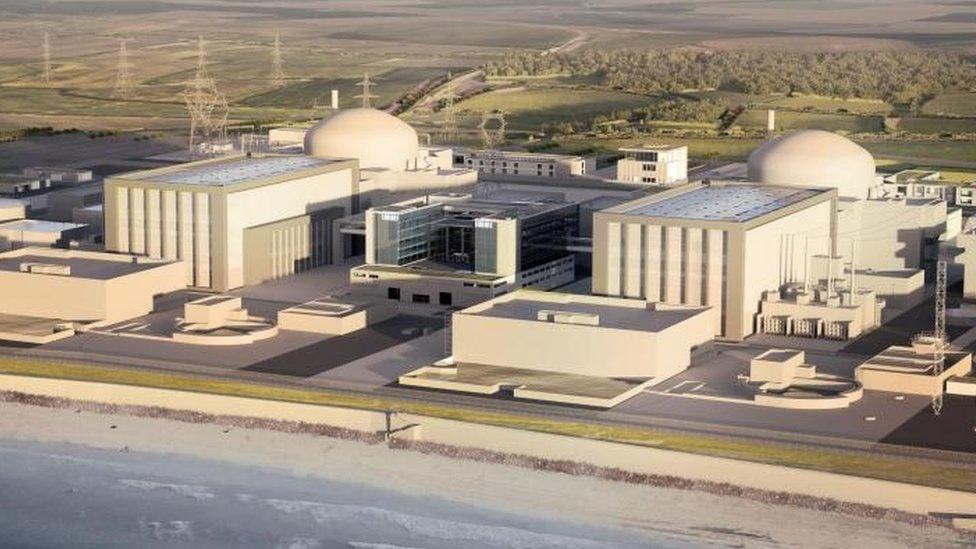Multi-billion pound new Hinkley nuclear plant 'is worth it'
- Published
- comments
Kamal Ahmed spoke to EDF chief Vincent de Rivaz
It is only on arrival at Hinkley Point C on the Somerset coast that the enormous scale of the £24.5bn project becomes clear.
Huge, yellow diggers are lined up on the edge of a cavernous building site, ready to start construction if and when this mega-deal between the government, the French energy giant, EDF, and two Chinese state nuclear companies is signed.
I understand that moment could come next month during the official visit of the Chinese president, Xi Jinping, to Britain.
David Cameron would certainly like that to be the case. As would EDF.
Hinkley Point C certainly has its critics.
Its monumental cost; the fact that the government has guaranteed a price for the electricity provided that is more than double the present wholesale price; the constant risk of cost over-runs and delays - as has been experienced in similar new nuclear projects run by EDF in France and Finland - weighs heavily.
Vincent de Rivaz, the UK chief executive of EDF, told me that new nuclear plants were essential for the UK and Hinkley C would be delivered "in time, not too late, not too early".
Relying on gas - even via new lower-carbon plants - would leave the UK dependant on energy imports and vulnerable to volatile global energy prices, he said.
And renewables - wind and solar - can only be relied on intermittently. A low carbon energy future will need nuclear power to provide the "base load", Mr de Rivaz argued.
"The reality is that we have to replace our old polluting power plants - and our nuclear power plants won't last forever," he said.
"We have lost, in the UK, 20% of the electricity generation in the last five years.
"We're going to lose 30% more by 2030, so nuclear energy is about having reliable round-the-clock energy.
"It will save customers at least 10% on their bills and above that, it will create 25,000 jobs up and down the country.
"It will boost the industrial stamina of this country. All in all it is worth it, believe me."

An artist's impression of what the Hinkley Point C power station will look like
Essential partner
What is becoming clear is Britain's increasing reliance on Chinese investment for major infrastructure projects.
On his visit to China today, the chancellor has called for Chinese bids for more than £11bn of contracts to build HS2, the proposed high speed rail link between London, Manchester and Leeds.
Mr de Rivaz said that China was now an essential partner, and that safety and security were the top priorities.
"We know these companies, we have been working with them for 30 years building nuclear power plants in China," he said.
"We are building two nuclear power plants in China with them. They are committed, as we are, to put safety as our priority.
"They are committed, as we are, to openness and transparency.
"We rely, all of us, on private investment to avoid taxpayers paying for these investments.
"The chancellor and government have a policy which is absolutely clear. Taxpayers money is for schools and the NHS and defence.
"Chinese investment in nuclear, at Hinkley, at [other future nuclear developments at] Bradwell, in Sizewell, means thousands of jobs here in the UK."